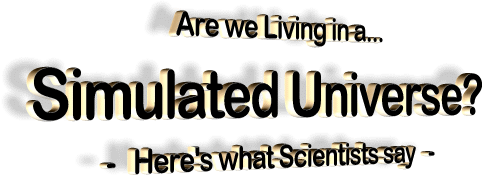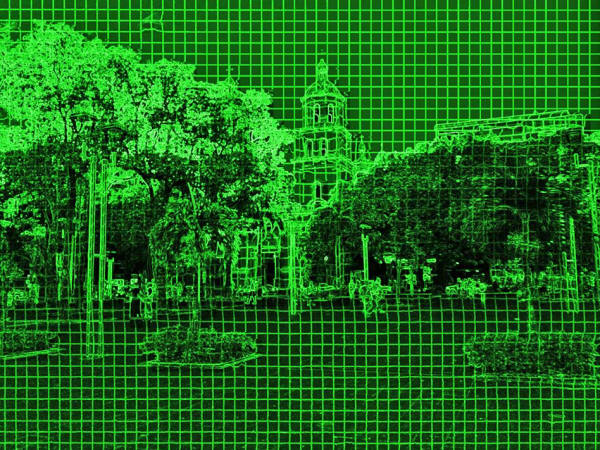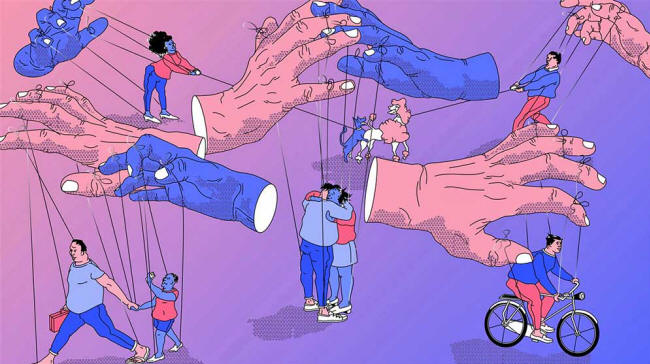|
say our world may have been created by beings more technologically savvy than ourselves. Johanna Walderdorff / for NBC News
then the cosmos that we are observing is just a tiny piece of the totality of physical existence"...
This, of course, is a familiar concept from science fiction books and films, including the 1999 blockbuster movie "The Matrix."
But some physicists and philosophers say it's possible that we really do live in a simulation - even if that means casting aside what we know (or think we know) about the universe and our place in it.
He recalls playing a virtual reality game so realistic that he forgot that he was in an empty room with a headset on.
That led him to wonder:
That question makes sense to Rich Terrile, a computer scientist at NASA's Jet Propulsion Laboratory in Pasadena, California.
Detailed as they are, today's best simulations don't involve artificial minds, but Terrile thinks the ability to model sentient beings could soon be within our grasp.
Not everyone is convinced.
During a 2016 debate at the American Museum of Natural History in New York City, Harvard University physicist Lisa Randall said the odds that the simulation hypothesis is correct are "effectively zero."
For starters, there's no evidence that our world isn't the array of stars and galaxies that it appears to be.
And she wonders why advanced beings would bother to simulate Homo sapiens.
Similarly, the idea of a
superior being forging a simulated universe parallels the notion of
a deity creating the world - for example, as described in the Book
of Genesis.
If the simulation hypothesis is correct, he says, then,
It's an ancient idea recast in terms of,
But for other scholars, including University of Maryland physicist Sylvester James Gates, the similarity between the simulation hypothesis and religious belief should be taken as a warning that we're off track.
Science, as he said in a recent radio interview, has taken us,
The simulation hypothesis, he said,
Who, or what, is the godlike entity that may have created a simulated universe?
One possibility, supporters of the simulation hypothesis say, is that it's a race of advanced beings - space aliens. Even more mind-bending is the possibility is that it's our own descendants - "our future selves," as Terrile puts it.
That is, humans living hundreds or thousands of years in the future might develop the ability to simulate not only a world like ours but the bodies and minds of the beings within it.
True, we don't yet have the technology to pull it off, but he says there's no conceptual barrier to it.
And once we create brain simulations,
Nick Bostrum says there's a remote chance that one day we might encounter a telltale glitch in the simulation.
More realistically, physicists have proposed experiments that could yield evidence that our world is simulated.
For example, some have wondered if the world is inherently "smooth," or if, at the smallest scales, it might be made up of discrete "chunks" a bit like the pixels in a digital image.
If we determine that the world is "pixelated" in this way, it could be evidence that it was created artificially.
A team of American and German physicists have argued that careful measurements of cosmic rays could provide an answer.
Some imagine such knowledge would disrupt our lives by upending our sense of purpose and squashing our initiative.
Harvard astronomer Abraham Loeb says the knowledge could even trigger social unrest.
Knowing that our thoughts and deeds aren't our own could,
Others imagine evidence in support of the simulation hypothesis could engender a new fear - that the creators might grow tired of the simulation and switch it off.
But not Bostrum.
Whatever we might think of the simulation hypothesis, Bostrom thinks the mere act of pondering it provides a welcome dose of humility.
He cites Hamlet's cautionary remark to a friend in Shakespeare's "Hamlet":
And Bostrom insists that he takes the simulation hypothesis seriously.
|



